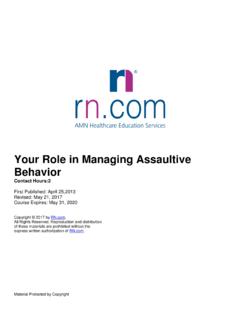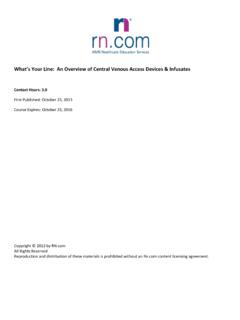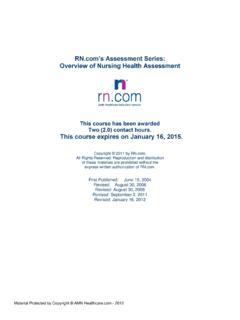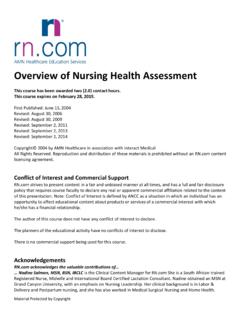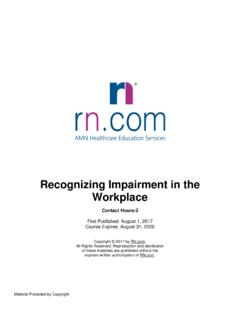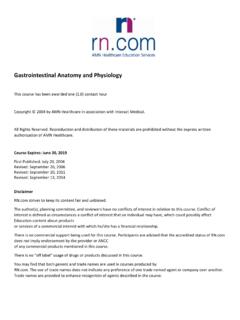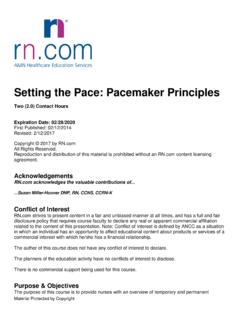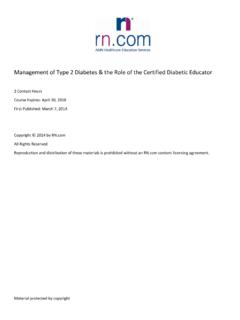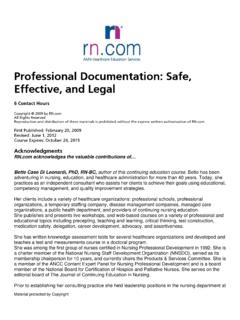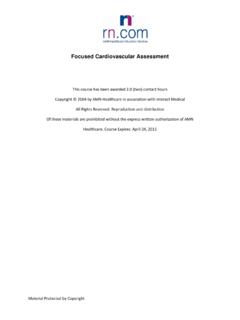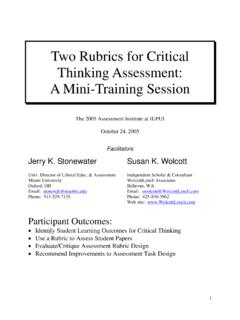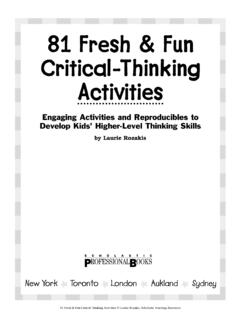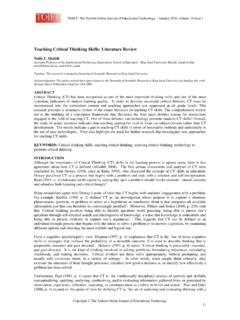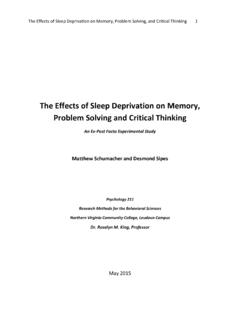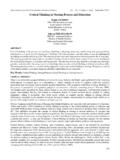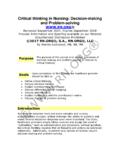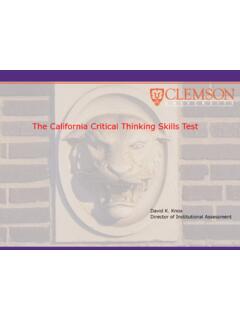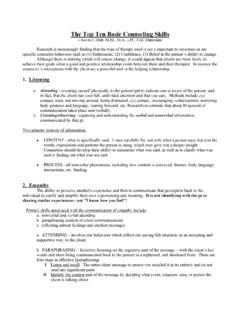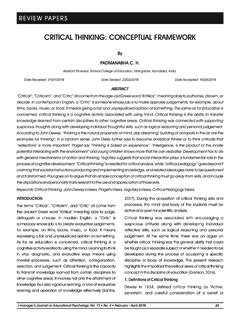Transcription of Critical Thinking: Work Smarter - RN.com
1 Critical thinking : Work Smarter This course has been awarded two (2) contact hours. This course expires on January 31, 2018 Copyright 2014 by All Rights Reserved Reproduction and distribution of these materials is prohibited without an content licensing agreement. First Published: August 11, 2011 Course Updated: August 15, 2014 Course Expires: August 29, 2014 Acknowledgements acknowledges the valuable contributions Bette Case Di Leonardi, PhD, RN-BC, is an independent nursing education consultant who assists her clients in achieving their goals using educational, competency management, and quality improvement strategies.
2 Bette also publishes and presents live workshops, and web-based courses on a variety of professional and educational topics and has written knowledge assessment tests for several healthcare organizations and teaches a test and measurements course in a doctoral program. She was among the first group of nurses certified in Nursing Professional Development in 1992. She is a charter member of the National Nursing Staff Development Organization (NNSDO), served as its membership chairperson for ten years, and currently chairs the Products & Services Committee.
3 She is a member of the ANCC Content Expert Panel for Nursing Professional Development and is a board member of the National Board for Certification of Hospice and Palliative Nurses. She serves on the editorial board of The Journal of Continuing Education in Nursing. Bette has also held leadership positions in several healthcare organizations and has directed departments of Nursing Education, Evaluation and Research, Critical Care Nursing, and Emergency Department Nursing. Bette earned her BSN at Syracuse University in Syracuse, New York, and her MSN and PhD in Educational Psychology at Loyola University Chicago, Chicago, Illinois.
4 Nadine Salmon, MSN, BSN, IBCLC is the Clinical Content Manager for She is a South African trained Registered nurse, Midwife, and International Board Certified Lactation Consultant. Nadine obtained an MSN at Grand Canyon University, with an emphasis on Nursing Leadership. Her clinical background is in Labor & Delivery and Postpartum nursing, and she has also worked in Medical Surgical Nursing and Home Health. Nadine has work experience in three countries, including the United States, the United Kingdome, and South Africa. She worked for the international nursing division of American Mobile Healthcare prior to joining the Education Team at Nadine is the Lead Nurse Planner for and is responsible for all clinical aspects of course development.
5 She updated course content to current standards, and develops new course materials for Conflict of Interest and Commercial Support strives to present content in a fair and unbiased manner at all times, and has a full and fair disclosure policy that requires course faculty to declare any real or apparent commercial affiliation related to the content of this presentation. Note: Conflict of interest is defined by ANCC as a situation in which an individual has an opportunity to affect educational content about products or services of a commercial interest with which he/she has a financial relationship.
6 The author of this course does not have any conflict of interest to declare. The planners of the educational activity have no conflicts of interest to disclose. There is no commercial support being used for this course. Purpose The purpose of this continuing nursing education course is to describe Critical thinking in a manner useful to practicing nurses and to illustrate examples of Critical thinking in nursing practice. Learning Objectives After successful completion of this course, you will be able to: 1. Define Critical thinking , including component Critical thinking attitudes and skills.
7 2. Explain a model of Critical thinking comprising knowledge, Critical reflection, and action. 3. Explain Critical thinking Indicators as developed by Alfaro-Lefevre. 4. Give examples of how nurses use Critical thinking skills in various aspects of the staff nurse role. Introduction Critical thinking is The ability to focus your thinking to get the results you need (Alfaro-LeFevre, 2009). The term Critical thinking is used in many different ways. The definition above provides you with two key factors in Critical thinking : Focus Results If you focus on getting the results you need, you are successfully using Critical thinking .
8 Test Yourself Alfaro-LeFevre describes Critical thinking as: A. The process in which you discover your inner self-worth. B. A priority-setting mechanism to accomplish all your goals. C. The ability to focus your thinking to achieve the desired results. The correct answer is C. Critical thinking is The ability to focus your thinking to get the results you need (Alfaro-LeFevre, 2014). Critical thinking in Practice When you walk into a patient s room, you instantaneously and unconsciously reflect on your knowledge base.
9 What do I already know about this patient that tunes me in to look for certain signs and symptoms? What do I know from my experiences with patients who have similar conditions? What have I learned recently about the condition this patient has and the regimens used to treat it? These reflections lead you to an important question to stimulate your Critical thinking : What else do I need to know and where will I find it? Based on your reflections on your knowledge base you may decide that you need to assess level of consciousness, or respiratory rate, or examine the IV site.
10 When you decide what assessments are most important, you are thinking critically. Your assessments combined with your knowledge will lead you to take action and to implement certain interventions. Case Study: PCA Pump Your patient, Mr. J is using the PCA pump to self-administer morphine. You count his respirations at six breaths per minute and find that he is difficult to arouse. Is there a problem here? If so, what is it? Yes, the problem is morphine toxicity. What will you do? Per organization policy, administer naloxone (Narcan ) Monitor the patient s response Continue to assess and manage pain Report and document per facility policy Investigate the cause: o Pump malfunction?
